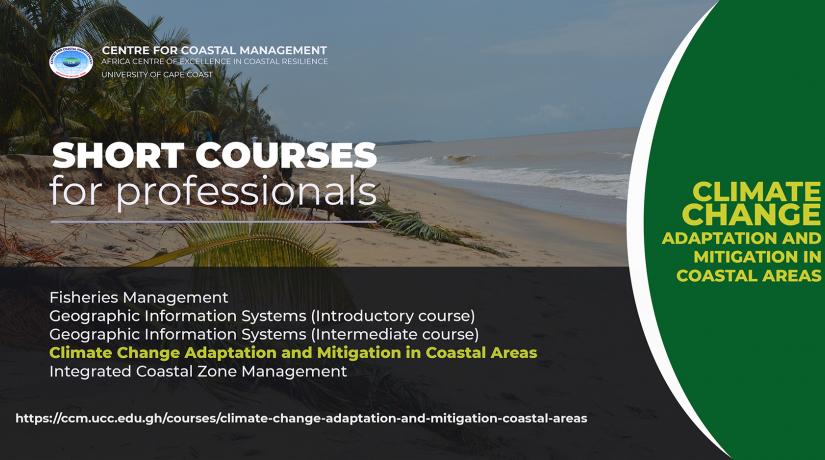Image

Posted On
Tuesday, February 27, 2018 - 13:25
Body
OVERVIEW
Climate change and variability is affecting communities today as seen with intermittent floods, seasonal drought, and increasing land and water temperatures. The “Coastal Adaptation to Climate Change” short course is a five-day intensive course for professionals working on coastal economies, spatial planning, environmental science and population/health. The course is designed to meet individual learning needs as well as to provide valuable and constructive feedback for both participants and trainers alike. This year, the five day workshop is targeted at journalists from selected media houses along the coastal zone of Ghana.
WHO WILL BENEFIT FROM ATTENDING?
Individuals actively engaged working in coastal communities or whose work is increasingly affected by the issues of coastal development and climate change. Participants may come from a wide range of organizations including:
- municipal and regional officials working in natural resources, fisheries, hazards, population, health and environment
- university lecturers, researchers and graduate students with extensive experience
- staff from non-governmental organizations addressing community development and the coastal environment
- project managers in development organizations and development banks
- businesses and corporations engaged in coastal development.
KNOWLEDGE BUILDING SESSIONS
The course covers five (5) Units as follows:
UNIT 1: Introduction to Coastal Ecosystems: Examines coastal ecosystems with emphasis on the types that occur in Ghana. It examines the types as well as their ecological functions as well as the socio-economic services they provide and finally outlines strategies for their protection.
Unit 2: Introduction to the Science of Climate Change: This Unit looks at changes in global and regional climate patterns that represent a threat greater than anything humans have faced in recent history.
UNIT 3: Climate Change Impacts, Adaptation and Mitigation:
Introduce participants to climate change vulnerability assessment and how this concept is operationalized with reference to degree of exposure of assets or sectors, their sensitivity and adaptive capacity to the impacts of climate change. It will expose the participants to a broad range of adaptation options or mitigation measures required across key economic sectors of Ghana’s economy.
Unit 4: Communication of Climate Change Issues:
This Unit outlines the strategies and methods for communicating climate change issues. It will identify the challenges in climate change communication, determine appropriate climate change communication methods and demonstrate skills for effective communication of climate change issues.
Unit 5: Field Activity on Climate Change Vulnerability Assessment: This Unit will engage participants in assessing climate change vulnerability in a selected coastal community during a practical field exercise. It would involve a field trip to a selected coastal community in the Western or Central region to assess the vulnerability of the community’s assets and livelihoods and propose appropriate adaptive actions.
LEARNING OUTCOMES
After the course, participants will be able to:
- Understand the causes of climate change and the role of human activity
- Understand/identify the effects of climate variability change in your community and appreciate how the effects of climate change is enhanced by human activity (i.e. sand mining, deforestation)
- Identify and analyze the threats to your assets and communities (non-climate and climate)
- Recognize what actions are being done today in Ghana that can contribute to future adaptation
- Suggest adaptations and mitigation that they promote in their jobs
- Communicate (Impart knowledge) about climate change causes and effects to their peers (boss and co-worker) and community at large
Last modified
